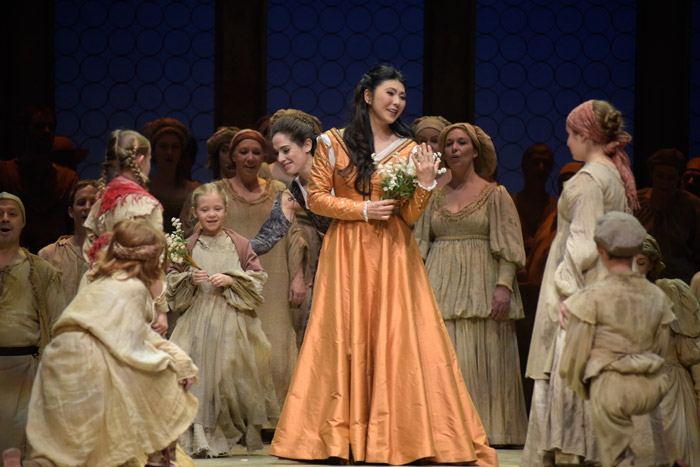Few stories are as tragic or as devastating as Shakespeare’s Othello, a drama that questions truth and character at its core. Guiseppi Verdi’s interpretation of the drama is equally haunting, with a satisfying balance of choral, solo, duet, and quartet pieces that highlight the complexities of the story. The libretto is slightly altered, jumping through some backstory to focus on Iago’s deceptive plots. Othello is a successful Moorish general in the Venetian Army, and unaware that his trusted ensign Iago plots carefully and maliciously for his demise, all the while unconcerned at the human costs that may become necessary in his pursuit of revenge.
Opera Montreal’s production of Otello was excellent musically. The cast shone with diverse and exciting music, and although the stage direction was lacking in some acts, the singers made up for it in their incredible vocal expression. Aris Argiris’ Iago was outstanding—his booming baritone was the focus of the many scenes, even over the title character Othello (tenor Kristian Benedikt). Argiris’ tenacious voice coupled well with his character’s remarkable appetite for deceit and villainy. Desdemona (Hiromi Omura) was a fresh and lovely voice in the midst of mostly male solos, a perfect interpretation of the character’s innocence, as well as a contrasting force to Othello’s growing forcefulness and Iago’s malice. Verdi’s arias showcased the soprano voice beautifully and Omura took up the tragic role with confidence and feeling.
The stage scenery was not as theatrical as it could or should be for such a dramatic opera. The opening scene of a tumultuous storm on the high seas seemed small in scale, and while Verdi’s music illustrated Iago’s treachery wonderfully, the stage did not support this feeling save for a few moments of spotlight and darkened background lighting. This was ultimately disappointing, as one would hope that the original drama of the theater would be maintained in the opera form.
As usual, Desdemona’s incantation of “Ave Maria” before she retires to her chambers is chilling, after witnessing so much of Shakespeare’s dramatic irony, which throughout the opera leaves the audience on the edge of their seats. Verdi’s aria hints at Desdemona’s hope, innocence, and faith in Othello, and when she finally rests it is only to the audience’s devastation, as we know what fate awaits her when she lays to rest. Omura’s light and lilting voice is a wonderful addition to the canon of famous renditions from the likes of Renee Fleming, Maria Callas, and Anna Netrebko.
Equally beautiful was the preceding aria commonly known as the “Willow Song,” in which Desdemona expresses her fears about her jealous husband. The audience is entranced in her panic as she mistakes the sound of the wind for an intruder in her bedroom. The aria is arguably the highlight of the entire opera, as the audience is privy to Desdemona’s deepest fears, sorrows, and hopes, all breathtakingly expressed in a dramatic woodwind motif and echoed by Desdemona’s powerful yet amazingly sensitive voice.
Argiris’ rendition of Iago’s “Credo” was also spectacular. The “Credo,” sung at the beginning of Act II, lays out Iago’s frightening sense of nihilism and godlessness. In the “Credo” he sings, “After all this foolishness comes death. / And then what? And then? / Death is Nothingness. / Heaven is an old wives' tale!” Again, Iago’s chilling, sinister attitude is unsupported by the staging, which seems almost unfinished or at least underdeveloped.
Opera is the most satisfying form for a story such as Shakespeare’s Othello. While not subjected to Shakespeare’s masterful language, the audience is immersed in Verdi’s music, which evokes a level of emotional response a world away from the spoken word. The power of opera is to bring emotion to life through music, which transcends barriers of language and acting. Overall, Opera Montreal’s Otello brought Othello’s tragedy to life admirably.
Otello will be playing at Sir Wilfrid Pelletier Hall on Feb. 4 and Feb. 6 at 7:30 p.m. Tickets begin at $20.








